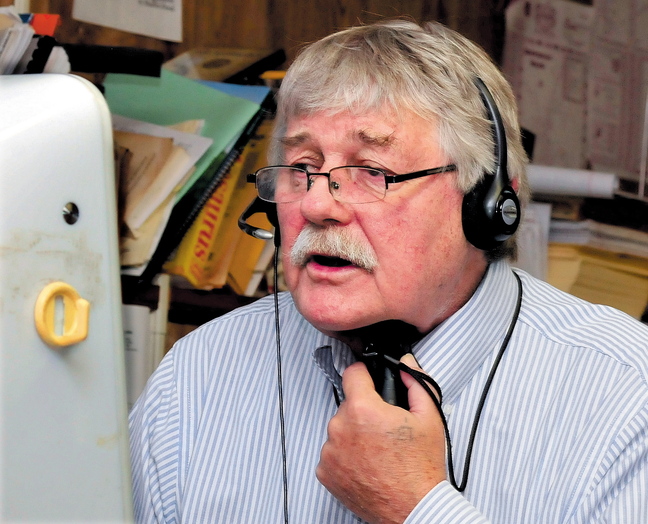SKOWHEGAN — About six months ago, Morning Sentinel reporter Doug Harlow got a phone call from a documentary journalism student who was inspired by an article he wrote.
Emily Kwong, 23, a student at the Salt Institute for Documentary Studies in Portland, read a news story about a Maine filmmaker who lost his work in a barn fire, and called Harlow to see if he could help her get in touch with the filmmaker.
Their conversation led her to another story, “Parts of Speech,” which is about Harlow’s life, including the loss of the reporter’s voice to throat cancer and how he learned to use an electronic device to help him speak.
The seven-minute radio documentary was selected as one of nine winners at the Third Coast International Audio Festival and will be recognized this weekend in Chicago before being broadcast nationally along with the other winners of the festival, which this year received 269 entries from 14 countries.
“Doug was such an interesting character and he was shown really sympathetically through the use of his electronic voice. We really got to know him through the story, which created great respect for the character,” said Julie Shapiro, Third Coast artistic director. “Our judges just fell in love with him.”
Kwong, who is an intern for two radio programs in New York City, produced the piece while a student at the Salt Institute in Portland last spring. Founded in 1973, the institute provides semester-long programs in documentary writing, radio, photography and multimedia to graduate and undergraduate students.
Kwong’s documentary opens with a recording of Harlow’s voice after he was diagnosed with throat cancer but before doctors removed his vocal cords in July 2005. In the recording, he tells his wife and children that he loves them. Then the story jumps eight years — Harlow’s cancer is gone but surgeons had to remove his larynx and gave him an electrolarynx, a battery-powered device he wears on a cord around his neck and holds against his throat to speak. He says he refused to give up on life, learned how to use the device and went back to work.
The piece tells of the first time Harlow went out in public with the voice and his return to work five weeks after the surgery. Colin Hickey, a reporter who worked with Harlow at the time of the surgery, said it was difficult for Harlow to return to work as a reporter, because people would hang up the phone when they heard the electronic voice.
It has been eight years since the surgery, but using the voice is still frustrating at times, said Harlow. Kwong said when she first pitched her idea to him, he wasn’t sure whether he wanted to be the subject of a radio documentary. “I said, âWell, Doug, I think that you being a journalist all this time it might be interesting for you to see what it’s like on the other side,'” said Kwong.
Rachel Ohm can be contacted at 612-2368 or at:rohm@centralmaine.com
Send questions/comments to the editors.




Success. Please wait for the page to reload. If the page does not reload within 5 seconds, please refresh the page.
Enter your email and password to access comments.
Hi, to comment on stories you must . This profile is in addition to your subscription and website login.
Already have a commenting profile? .
Invalid username/password.
Please check your email to confirm and complete your registration.
Only subscribers are eligible to post comments. Please subscribe or login first for digital access. Here’s why.
Use the form below to reset your password. When you've submitted your account email, we will send an email with a reset code.